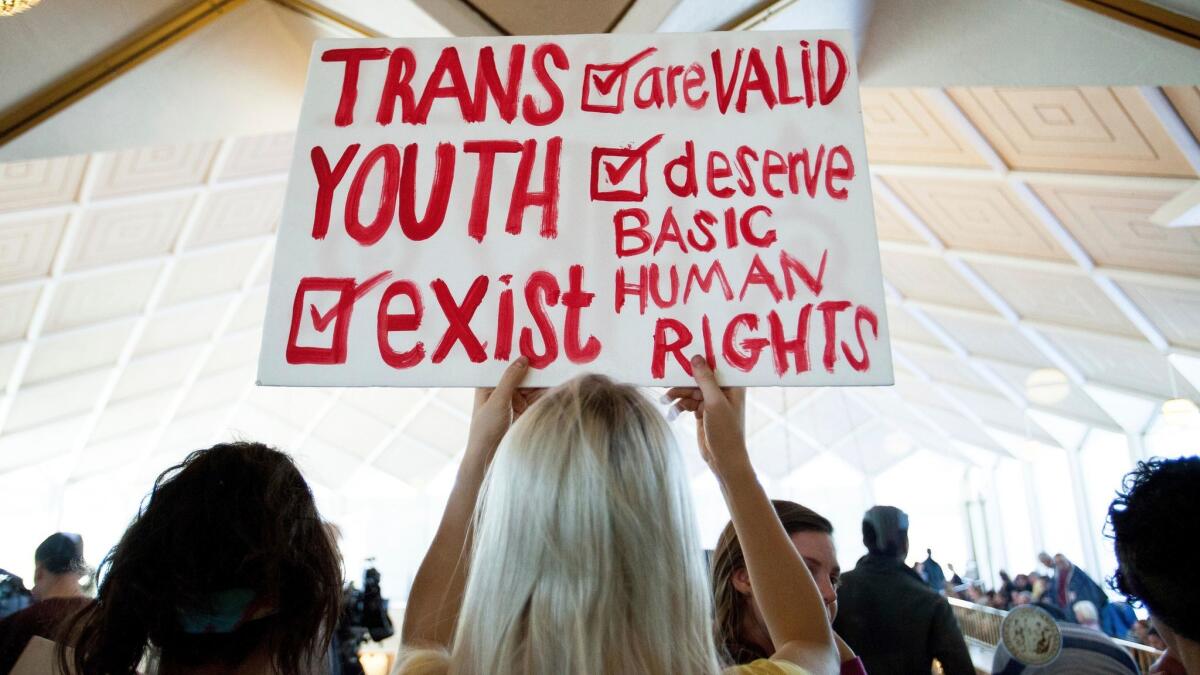Even as gay rights battles are won, transgender people continue to face obstacles

In post-marriage-equality America, where same-sex couples live openly and increasingly are embraced in their communities, those on the conservative right who once pushed back against gay rights now appear to have shifted their focus to the transgender community.
So far this year, 10 states have introduced a flurry of bills that would make life tougher for transgender people, especially students who try to use campus restrooms that match their gender identity. And earlier this month, the U.S. Department of Education confirmed that it will no longer investigate civil rights complaints from transgender students who say they were barred from using restrooms that align with their gender identity.
“We’re seeing proposals around the country that would make it harder for trans people to go to work, go to school, participate in public life, or even do things as simple as go to the store or go to a restaurant with their family,” said Jay Wu, communications manager at the National Center for Transgender Equality. “If laws like this pass, they can send a message to transgender people and their families that they are not as worthy as their peers and that they don’t deserve to have the same rights as everyone else.”
Education Department Press Secretary Liz Hill said it is not breaking news that her office won’t investigate bathroom-related complaints. That shift, she said, was made last year when President Trump rescinded the Obama administration’s directive that discrimination against transgender students on the basis of gender identity violates Title IX.
Contrary to President Obama’s view, Hill said that Title IX prohibits discrimination on the basis of sex, not gender identity.
“Where students, including transgender students, are penalized or harassed for failing to conform to sex-based stereotypes, that is sex discrimination prohibited by Title IX,” Hill said. “In the case of bathrooms, however, longstanding regulations provide that separating facilities on the basis of sex is not a form of discrimination prohibited by Title IX.”
LGBTQ advocates, however, said they are surprised by the Education Department’s tough stance and see it as further evidence that transgender people are facing more and more obstacles — legal battles, legislation and policies that make life difficult.
Lawmakers seem undeterred by the backlash seen in North Carolina after the state in early 2016 passed its controversial “bathroom bill,” which in effect barred transgender people from using restrooms that aligned with their gender identity. North Carolina lost millions in revenue — new employers, conventions and sporting events — because of the decision.
Of the 10 states that have introduced legislation aimed at the transgender community, seven have crafted bills that are a variation of North Carolina’s bathroom bill, according to the National Center for Transgender Equality. Two states, Alaska and Massachusetts, are also considering ballot initiatives that could restrict the freedoms of transgender people.
In Tennessee, four bathroom-related bills were introduced, including three that require the state to provide legal defense for schools that adopt North Carolina-like restroom bans and for employees of those schools.
In South Dakota, two conservative lawmakers proposed a bill to prohibit public school teachers from even mentioning “gender identity” or “gender expression” to students in kindergarten through seventh grade. And in New Hampshire, a proposed bill would have made providing transition-related medical care to a minor, including puberty blockers and hormone therapy, a form of child abuse. The bill has since died in committee.
“I would say what we’re seeing with transgender people is history repeating itself,” said Seth Galanter, senior director at the National Center for Youth Law.
“We saw the same thing 60 years ago with integrating black and white kids together. We saw it 40 years ago integrating kids with disabilities into public schools, and now we’re seeing it with transgender people,” Galanter said.
Galanter, who worked in the Obama administration when it issued the gender identity guidelines, said transgender students are at risk of being deprived of basic civil liberties.
Hill said that Education Secretary Betsy DeVos believes it is the job of Congress or the courts, not the bureaucracy, to determine whether or not the term “sex” under Title IX encompasses “gender identity.”
But Galanter — and other advocates — contend that courts have already made that determination, including a ruling last May by the U.S. 7th Circuit Court of Appeals in Whitaker vs. Kenosha Unified School District in Wisconsin.
The case involved Ash Whitaker, a transgender student, who was denied access to male-designated restrooms at his high school.
The 7th Circuit — which includes Illinois, Indiana and Wisconsin — noted in its ruling: “A policy that requires an individual to use a bathroom that does not conform with his or her gender identity punishes that individual for his or her gender non-conformance, which in turn violates Title IX.”
Galanter said the Trump administration’s decision — to not pursue civil rights complaints from transgender students on the basis of gender identity — puts an economic and emotional burden on transgender students and their parents.
“The Office for Civil Rights has closed its doors to these complaints, and for a lot of people, they can’t afford a lawyer, and they don’t want to make a big scene in a courtroom,” Galanter said. “They just want their kid to be able to go to school.”
To read this article in Spanish, click here
More to Read
Sign up for Essential California
The most important California stories and recommendations in your inbox every morning.
You may occasionally receive promotional content from the Los Angeles Times.











